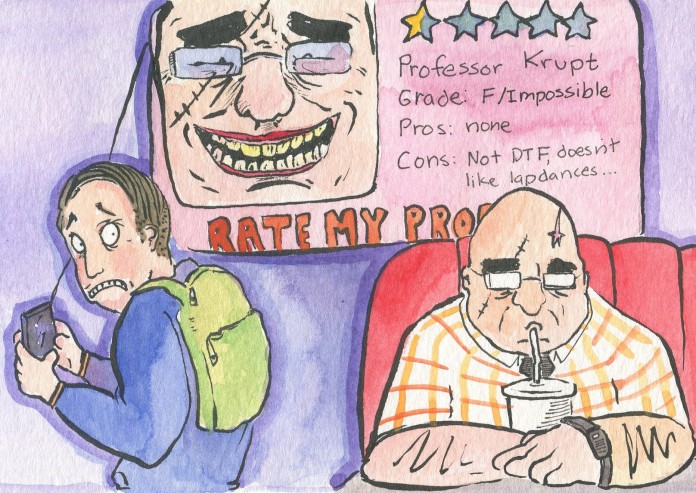Julius Koch
Illustration by Luis Bondoc, Staff Illustrator
As the fall quarter gets under way at the wonderful University of California at Santa Barbara, many students will have already taken the time to meet their new professors. Many, however, didn’t do this in person, but rather through the popular website Ratemyprofessors.com.
The main objective of RateMyProfessors seems to be to help students choose classes and understand how to be most successful in their courses. The site uses criteria that include “helpfulness,” “clarity,” “easiness,” and even “hotness,” so users can quickly gain an idea about the quality of their new professors.
While the site was created with good intentions and continually hopes to help students in their educational pursuits, two main problems prevent it from doing so: not only are the reviews in and of themselves not credible, but the site could lead people to make important and potentially adverse decisions based upon them.
Since there is no system of identification, anyone from anywhere can take a few minutes to submit a review about any professor from any institution. An additional flaw is that a single person could submit reviews from a variety of different devices.
The reviews are also submitted anonymously, so no reviewer can be held accountable for their statements. You could essentially visit the website and submit a controversial review about a professor whom you have never even taken a class with.
The website also often attracts extreme opinions, as it doesn’t have a constant set of critics. Users who may have been upset with the grade they received or the rigor of the class could take to RateMyProfessors to vent and tear apart the professor who they deem responsible.
By asking reviewers to explain the attractiveness of their professors and the grades they received, the site naturally emphasizes reviewing based on emotion rather than logic or some sort of academic rationale. Less time is spent critiquing teaching styles than it is criticizing the difficulty of a class or the harshness of the grading. Generally, teachers who are considered “hotter” and labeled as “easy graders” will receive higher ratings.
If you are attending lectures in the hopes of sitting in the front and watching an attractive professor pace back and forth, it may be time to be honest with yourself and reconsider your priorities. If you are trying to find the easy A’s around campus, I encourage you to try making your education your own and get into the material you are studying instead of trying to skim by with little involvement in your class. It’s all too expensive for that.
The rigor of a class or its grading can provide an awesome challenge for students interested in their respective fields of study, and you never know what meaningful relationships and connections you could gain through different faculty members at the school. Students should be encouraged to form their own opinions and forge their own paths in their education. You’ll never know what you are missing if you are deterred by a poor or spurious rating on a website. You will never open that door to find that passion, get that internship, or make that connection.
Decisions such as course selections are very important in and of themselves as the opportunity cost, in terms of time and money, is very high in college. It is best to form your own opinions about professors rather than rely on others’ views.
Many people have at some point enjoyed a film that was given low ratings in the papers. If you take the course and truly feel like your professor is inhibiting your ability to learn or enjoy a topic effectively, you can always restructure your schedule. At least you gave it a chance, and taking chances is a behavior that is bound to pay off at some point.
If, come winter, you can’t resist visiting RateMyProfessor, at least tread lightly and try to avoid making major decisions for yourself based off of the opinions of others. After all, you are the one who will have to live with them.











